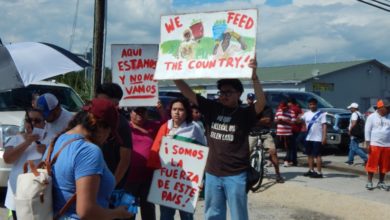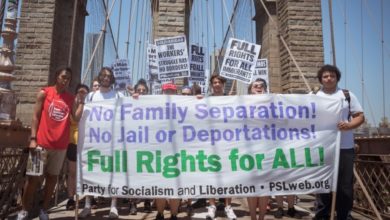On
July 2, nearly 15,000 marchers descended on the capitol in response
to the implementation of the newest anti-immigrant law. Earlier in
the week a federal judge blocked parts of the racist legislation that
was made into law in mid-May, while other aspects are being
implemented.
One
part of the law makes applying for a job without authentic
identification a felony with prison time up to 10 years and a
$100,000 fine—targeting undocumented workers who largely work in
the agricultural industry.
“We
see the criminalization of every sector of the working class from
those who are super exploited, like immigrant workers, to other
workers who are fighting for union rights trying to survive on low
wages and little or no benefits,” said Adeyami Hayes, a Party for
Socialism and Liberation organizer in Atlanta, Ga.
“What
is key now is to continue to build a multi-national fightback to push
back these divisive laws and step up a united workers’ fightback,”
concluded Hayes.
The
street swelled with thousands of men, women and children of all ages.
The protesters were largely Latino, but included significant
participation from other nationalities.
“We
are the same community: We have to fight for our rights,” commented
MiLi Lai, a Chinese student at Emory University who attended the
rally as the new law attacks all workers born outside of the U.S.
The
day before the march, the Georgia Latino Alliance for Human Rights
called for a “day without immigrants” action spurring businesses
to close and supporters to not shop or work in protest.
It
is estimated that as many as 500,000 workers are undocumented in the
state—working largely in the $69 billion agribusiness.
The
profit system promotes racist, anti-immigrant worker laws to sow
division against the growing possibility of multi-national working
class unity. Capitalism is doing this even if it creates an initial
loss for agribusiness, because it is the divisions that keep the
system in place. The super exploitation of one sector of the working
class—the immigrant
community—heightens
exploitation of all workers, lowering wages and benefits.
Already
in Georgia, it is reported that there has been a 30 percent drop in
harvests in blackberries and other agriculture commodities in season.
As
racist, anti-immigrant laws pass around the country, PSL is committed
to be part of the movement that fights for amnesty and full rights
for all workers.






